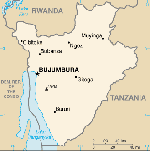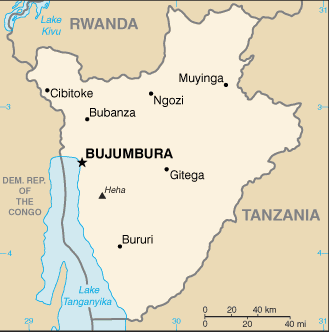 Burundi
Burundi
Country Specific Information
On this page » |
|
April 21, 2008
COUNTRY DESCRIPTION:
 One of the poorest countries in the world, Burundi is a small, densely populated central African nation bordering Lake
Tanganyika, Rwanda, Tanzania and the Democratic Republic of Congo. After more than 12 years of civil and ethnic strife, an
electoral process deemed free and fair resulted in the installation of a democratic government in 2005. Years of fighting
have devastated a historically fragile economy that depends largely on subsistence agriculture. Poor public health and education,
weather disasters such as drought and floods, crop diseases and lack of infrastructure exacerbate the effects of conflict
and delay recovery. Facilities for tourism, particularly outside the capital, are limited. Read the Department of State Background Notes on Burundi for additional information.
One of the poorest countries in the world, Burundi is a small, densely populated central African nation bordering Lake
Tanganyika, Rwanda, Tanzania and the Democratic Republic of Congo. After more than 12 years of civil and ethnic strife, an
electoral process deemed free and fair resulted in the installation of a democratic government in 2005. Years of fighting
have devastated a historically fragile economy that depends largely on subsistence agriculture. Poor public health and education,
weather disasters such as drought and floods, crop diseases and lack of infrastructure exacerbate the effects of conflict
and delay recovery. Facilities for tourism, particularly outside the capital, are limited. Read the Department of State Background Notes on Burundi for additional information.
ENTRY/EXIT REQUIREMENTS: A passport, visa and evidence of immunization against yellow fever are required for entry. Travelers with an expired visa
are not permitted to leave the country without acquiring an exit visa prior to departure. The latest information about visas
may be obtained from the Embassy of the Republic of Burundi, Suite 212, 2233 Wisconsin Avenue NW, Washington, DC 20007, telephone
(202) 342-2574, or from the Permanent Mission of Burundi to the United Nations in New York at telephone (212) 499-0001 thru
0006.
For information about dual nationality or the prevention of international child abduction, please refer to related web pages at http://travel.state.gov. For further information about customs regulations, please read our Customs Information sheet.
SAFETY AND SECURITY: See the Department of State’s Travel Warning for Burundi.
For the latest security information, Americans traveling abroad should regularly monitor the Department of State Bureau of
Consular Affairs’ web site at http://travel.state.gov, where the current Travel Warnings and Travel Alerts, as well as the Worldwide Caution, can be found.
Up-to-date information on safety and security can also be obtained by calling 1-888-407-4747 toll free in the U.S. and Canada, or, for callers outside the U.S. and Canada, a regular toll-line at 1-202-501-4444. These numbers are available from 8:00 a.m. to 8:00 p.m. Eastern Time, Monday through Friday (except U.S. federal holidays).
The Department of State urges American citizens to take responsibility for their personal security while traveling overseas. For general information about appropriate measures travelers can take to protect themselves in an overseas environment, see the Department of State’s pamphlet A Safe Trip Abroad.
CRIME: Crime, often committed by groups of armed bandits, poses a high risk for foreign visitors to Bujumbura and Burundi in general. Common
crimes include mugging, purse-snatching, pick pocketing, burglary, automobile break-ins and carjacking. Many criminal incidents
involve armed attackers. Armed criminals often ambush vehicles, particularly on the roads leading out of Bujumbura. Criminals
in Bujumbura often operate in pairs or in small groups involving six or more individuals. Due to insufficient resources, local
authorities in any part of Burundi are often unable to provide timely assistance in case of need.
U.S. Government personnel are prohibited from walking on the streets during the hours of darkness and using local, public
transportation. Foreigners, whether in vehicles or at home, are always potential crime targets. Americans should exercise
common sense judgment and take the same precautions as one would in any major city.
INFORMATION FOR VICTIMS OF CRIME: The loss or theft abroad of a U.S. passport should be reported immediately to the local police and the nearest U.S. Embassy or Consulate. If you are the victim of a crime while overseas, in addition to reporting to the local police, please contact the nearest U.S. Embassy or Consulate for assistance. The Embassy/Consulate staff can, for example, help you to find appropriate medical care, contact family members or friends and explain how funds could be transferred. Although the investigation and prosecution of the crime is solely the responsibility of local authorities, consular officers can help you to understand the local criminal justice process and to find an attorney if needed. See our information on Victims of Crime.
MEDICAL FACILITIES AND HEALTH INFORMATION: Medical facilities in Burundi generally do not meet Western standards of care. Travelers should carry an ample supply of
properly-labeled prescription drugs and other medications with them, as certain medications and prescription drugs are unavailable
or in short supply. Sterility of equipment is questionable, and treatment is unreliable. Ambulance assistance is non-existent. Hospital
care in Burundi should be considered in only the most serious cases and when no reasonable alternatives are available.
Malaria prophylaxis is recommended for travel to all parts of Burundi.
Information on vaccinations and other health precautions, such as safe food and water precautions and insect bite protection,
may be obtained from the Centers for Disease Control and Prevention’s hotline for international travelers at 1-877-FYI-TRIP
(1-877-394-8747) or via the CDC’s web site at http://wwwn.cdc.gov/travel/default.aspx. For information about outbreaks of infectious diseases abroad consult the World Health Organization’s (WHO) web site at
http://www.who.int/en. Further health information for travelers is available at http://www.who.int/ith/en.
MEDICAL INSURANCE: The Department of State strongly urges Americans to consult with their medical insurance companies prior to traveling abroad to confirm whether their policies apply overseas and/or cover emergency expenses such as a medical evacuation. Please see our information on medical insurance overseas.
TRAFFIC SAFETY AND ROAD CONDITIONS: When in a foreign country, U.S. citizens may encounter road conditions that differ significantly from those in the United
States. The information below concerning Burundi is provided for general reference only, and may not be totally accurate in
a particular location or circumstance.
While travel on most roads is generally safe during the day, travelers must maintain constant vigilance. There have been regular
reports of violent attacks on vehicles traveling the roads throughout the country outside of Bujumbura. U.S. Government personnel
are required to travel upcountry via two-vehicle convoys and have their trips pre-approved by the Regional Security Officer. The
Embassy recommends that Americans not travel on the national highways from dusk to dawn. Drivers without valid permits, and
the ease with which a driver's license can be acquired without training, make Burundian drivers less careful, predictable,
or mindful of driving rules than Western drivers may expect.
There are no traffic signals in Bujumbura, and virtually nothing of the kind elsewhere in the country. Roadways are not marked,
and the lack of streetlights or shoulders makes driving in the countryside at night especially dangerous. Additionally, drivers
may encounter cyclists, pedestrians, and livestock in the roadway, including in and around the capital. Mini-vans used as
buses for 18 persons should be given a wide berth as they start and stop abruptly, often without pulling to the side of the
road.
Large holes or damaged portions of roadway may be encountered anywhere in the country, including in Bujumbura; when driving
in the countryside, it is recommended that travelers carry multiple spare tires. During the rainy season, many side roads
are passable only with four-wheel drive vehicles. Burundi’s supply of gasoline and diesel fuel are imported predominantly
from Kenya and Tanzania, and are relatively expensive due to high transportation costs. Service stations are rare outside
of the major cities.
Third-party insurance is required, and it will cover any damages (property, injury, or death). If you are found to have caused
an accident, you automatically will be fined 10,000 Burundian francs (approximately $10 U.S.) and your driver's license will
be confiscated until the police investigation is completed. Although the law provides for the arrest of drunk drivers, in
practice, the police do not act on this law. In the city of Bujumbura, the number for police assistance is 22-22-37-77; there
is no comparable number outside the capital. If you are involved in an accident causing death, it is advised that you leave
the scene of the accident and proceed to the nearest police station.
Please refer to our Road Safety page for more information.
AVIATION SAFETY OVERSIGHT: As there is no direct commercial air service to the United States by carriers registered in Burundi, the U.S. Federal Aviation Administration (FAA) has not assessed Burundi’s Civil Aviation Authority for compliance with International Civil Aviation Organization (ICAO) aviation safety standards. For more information, travelers may visit the FAA’s web site at http://www.faa.gov/safety/programs_initiatives/oversight/iasa.
SPECIAL CIRCUMSTANCES: There are no ATMs located in the country and most Burundian hotels and businesses do not accept credit cards. Many hotels
in Bujumbura accept payment in U.S. dollars or Euros from non-Burundians. Travelers should be aware that Burundian banking
practices prohibit acceptance of U. S. currency printed before the year 2003.
The Embassy recommends that visitors do not photograph airports, military installations, or other government buildings, and
obtain permission from individuals before taking their photographs. Please see our Customs Information.
CRIMINAL PENALTIES: While in a foreign country, a U.S. citizen is subject to that country's laws and regulations, which sometimes differ significantly from those in the United States and may not afford the protections available to the individual under U.S. law. Penalties for breaking the law can be more severe than in the United States for similar offenses. Persons violating Burundian laws, even unknowingly, may be expelled from the country, arrested or imprisoned. Penalties for possession, use, or trafficking in illegal drugs in Burundi are severe, and convicted offenders can expect long jail sentences and heavy fines. Engaging in sexual conduct with children or using or disseminating child pornography in a foreign country is a crime, prosecutable in the United States. Please see our information on Criminal Penalties.
CHILDREN'S ISSUES: For information on intercountry adoption and international parental child abduction see our Office of Children’s Issues web pages
REGISTRATION / EMBASSY LOCATION: Americans living or traveling in Burundi are encouraged to register with the U.S. Embassy through the State Department’s
travel registration website so that they can obtain updated information on travel within Burundi and the Embassy’s current
security policies, including areas that are off-limits to U.S. Government personnel for security reasons. Americans without
Internet access may register directly with the U.S. Embassy. By registering, American citizens make it easier for the Embassy
to contact them in case of emergency. The U.S. Embassy is located on Avenue des Etats-Unis, telephone (257) 22-22-34-54, fax
(257) 22-22-29-26. The Embassy's web site is http://burundi.usembassy.gov/.
* * *
This replaces the Country Specific Information for Burundi dated July 18, 2007, to update sections on Country Description,
Entry/Exit Requirements, Medical Facilities and Health Information, and Traffic Safety and Road Conditions.

